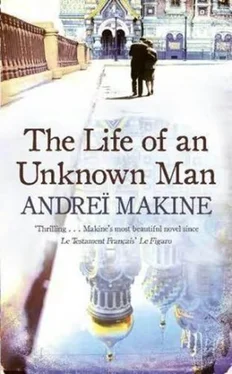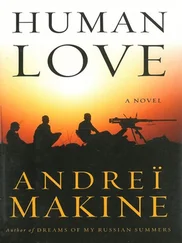Andreï Makine - The Life of an Unknown Man
Здесь есть возможность читать онлайн «Andreï Makine - The Life of an Unknown Man» весь текст электронной книги совершенно бесплатно (целиком полную версию без сокращений). В некоторых случаях можно слушать аудио, скачать через торрент в формате fb2 и присутствует краткое содержание. Жанр: Современная проза, на английском языке. Описание произведения, (предисловие) а так же отзывы посетителей доступны на портале библиотеки ЛибКат.
- Название:The Life of an Unknown Man
- Автор:
- Жанр:
- Год:неизвестен
- ISBN:нет данных
- Рейтинг книги:3 / 5. Голосов: 1
-
Избранное:Добавить в избранное
- Отзывы:
-
Ваша оценка:
- 60
- 1
- 2
- 3
- 4
- 5
The Life of an Unknown Man: краткое содержание, описание и аннотация
Предлагаем к чтению аннотацию, описание, краткое содержание или предисловие (зависит от того, что написал сам автор книги «The Life of an Unknown Man»). Если вы не нашли необходимую информацию о книге — напишите в комментариях, мы постараемся отыскать её.
The Life of an Unknown Man — читать онлайн бесплатно полную книгу (весь текст) целиком
Ниже представлен текст книги, разбитый по страницам. Система сохранения места последней прочитанной страницы, позволяет с удобством читать онлайн бесплатно книгу «The Life of an Unknown Man», без необходимости каждый раз заново искать на чём Вы остановились. Поставьте закладку, и сможете в любой момент перейти на страницу, на которой закончили чтение.
Интервал:
Закладка:
During those May days the war ended for them. One year after the end of the war.
A long time later, returning in thought to that year lived on the banks of the Lukhta, Volsky would be struck by the length of time taken by what, in fact, was only the first stage of settling in. Each of the seasons would seem like a whole lifetime. An autumn lifetime, the embroidery of the hoarfrost on the gold of the dead leaves. A winter lifetime, that kerosene lamp at their window, a stray gleam in a snowstorm. A spring lifetime, those nights when the waters came right up to the old wooden front steps… And the summer, too, their house afloat on the bluish swell of the grasses and the flowers. He would remember that very slow, very intimate eternity, a single day of which could smooth away all the wounds of his broken life.
The same thought struck them both and they exchanged amused glances: this white foal, yes, with the slightly clumsy grace of infancy, the freedom of a creature still ignorant of life’s barriers… It ran along the shore, went into the water, backed away with an abrupt caper, pranced back up the slope.
Volsky was busy repairing the roof; Mila, on a ladder, was passing him tar-coated wooden battens. From time to time they broke off, happy to see so much simultaneous activity from their lofty perch. The frisking of the foal, children bathing in the river, and a little farther on, beyond the willow plantations, women gathering the hay into haycocks and a very small girl amusing herself by climbing onto the precarious piles and balancing upright on them like an acrobat.
Suddenly she fell and at the same moment an explosion rang out. Beyond the trees a curtain of spurts of earth and smoke arose. The foal galloped on a few more yards before collapsing, its right flank torn away. A mine, which the sappers had failed to remove the previous fall…
Volsky and Mila grasped what had happened: a rapid sequence of events: the foal galloping, the little girl falling, thrown off balance by the roar of the explosion, the frozen postures of the peasant women, and finally that confusion of white and red thrashing about briefly in the dust.
The lives of other people, which they had believed they could keep at a distance, were unfolding, mingling the traces of war with the routine of peacetime, the tears of the little girl as she walked toward the dead foal with her head averted. And the children appearing from all sides, hiding their curiosity behind frightened faces. And a little later the kolkhoznik who came with a wheelbarrow, dismembered the carcass with a few blows of an ax, loaded up the meat, and buried the rest in the hole left by the explosion.
They forced themselves not to see this death as a portent. For a while their own world, this fragile timelessness apart from the world, could survive. And then one day at the end of August this strange observer made his appearance. They were high on the ridge above the shore in the middle of putting up a fence around the place where the soldiers were buried. Mila was writing a name they had managed to identify on one of the grave markers…
She was the first to notice the strange lookout. On the opposite bank, not far from their house, stood a black car, an army officer had a huge pair of binoculars focused on the graveyard where they were working. His bizarrely static posture, his cape, excessively long in view of the fine drizzle that veiled the horizon, everything about this dumb show seemed disproportionate and menacing. It was rather like picturing a general surveying a battlefield. Another officer appeared and the statue with the binoculars stirred, shook its head, and both walked toward the house. The daylight was fading but from the top of the ridge the two men could clearly be seen going up to the windows, peering inside…
In the time it took Volsky and Mila to go down to their boat and cross the Lukhta, the officers had gone. The only traces were a cigarette stub with a fine gold band and the imprint of a boot on the flower bed in front of the house. “They must have been surveyors on reconnaissance,” said Volsky, pretending to be unconcerned. “They’ve probably got a map to draw up.”
For him the army officers’ visit was a secret relief. As if, not having the courage to wake up from his dream and to arouse Mila, he had been helped by their appearance. The world was there, on the threshold of their love.
In referring to them as “army officers” he had been lying, their uniform was unmistakable. And it was Mila who remarked on it. “It’s odd, those two fellows from State Security. It reminds me of what happened the other day at school. Yes, there was an inspector… The head teacher told me in advance she’d be coming, so there was nothing unexpected about it. Except that she stood there, as still as a stone. Like that man spying on us with his binoculars. Then she went away without saying a word. Apparently the songs I teach the children are not ideologically correct…”
They were sitting on the front steps of their izba. Now that the waters had subsided, the house seemed to be perched even higher above the fields and more solitary. Volsky listened, hesitated before replying: he must either attempt a reassuring tone and therefore lie, or else… He bowed his head and suddenly noticed another cigarette stub ringed with a band of gold among the tufts of grass. Like a gimlet eye staring at them.
“You know, Mila, I haven’t mentioned this to you, but the mail I deliver…” He broke off, conscious that his voice sounded guilty, although there was no fault to confess. “Yes, I notice more and more letters coming from prisons. I think it’s started again, the purges…”
They said very little to one another, using the oblique turns of phrase that everyone employed at the time. One did not say “so and so has been arrested” but “he’s had problems.” Indeed, Mila could not have said “those fellows from State Security”; that form of words would come later in Volsky’s reminiscences, when it became possible to talk about it. At the time, she would simply have spoken of “the Big House,” which was how people referred to the secret police headquarters in Leningrad.
In a few more or less coded words, they said it all to one another: the waves of arrests, unleashed to an extent worse than ever before, the fear that, after a brief relaxation at the end of the war, was turning faces to stone again, the suspicion that marked every word. The victory over the Nazis had freed the hands of the local persecutors, now eager to make the people pay for their own cowardice.
Mentioning two or three details about each of the individuals who had disappeared, Volsky and Mila recalled those who had “had problems”: people living in the neighboring small town, old friends in Leningrad. Already a long litany of ghosts. They knew people chose different tactics for survival. Some pretended to notice nothing, talked, went to work, smiled at their families, sleepwalking like torpid automatons. Others transformed their lives into the waiting of a condemned man, rehearsing in soliloquy the arguments they believed would prove their innocence, slept fully dressed, knowing that arrests took place at night. Sometimes they went mad. Yet others attempted to defuse the threat by mocking it.
“My father did that.” Volsky realized he was talking about this for the first time. “In the days of collectivization in our village, if they found a bag of corn hidden in a peasant’s house the fellow was shot. Soon it was enough that you hadn’t declared a tool or a dozen eggs. I was still a child but I remember the day very well. It was winter, you know, freezing cold. My father went out without his coat, barefoot in the snow, and carried the only pair of boots he had left to the Expropriation Committee. He managed to adopt a very serious, almost fervent expression: ‘I’m giving everything I have for the building of socialism!’ The Party bosses were terribly embarrassed by fervor like this. In the end they decided he wasn’t all there. They gave him back his boots and left us alone… Sometimes being mad could save you.”
Читать дальшеИнтервал:
Закладка:
Похожие книги на «The Life of an Unknown Man»
Представляем Вашему вниманию похожие книги на «The Life of an Unknown Man» списком для выбора. Мы отобрали схожую по названию и смыслу литературу в надежде предоставить читателям больше вариантов отыскать новые, интересные, ещё непрочитанные произведения.
Обсуждение, отзывы о книге «The Life of an Unknown Man» и просто собственные мнения читателей. Оставьте ваши комментарии, напишите, что Вы думаете о произведении, его смысле или главных героях. Укажите что конкретно понравилось, а что нет, и почему Вы так считаете.









